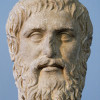“ Are friends to be interpreted as real or seeming; enemies as real or seeming? And are our friends to be only the good, and our enemies to be the evil? The answer is, that we must do good to our seeming and real good friends, and evil to our seeming and real evil enemies—good to the good, evil to the evil. But ought we to render evil for evil at all, when to do so will only make men more evil? ”
Plato, The Republic. copy citation
| Author | Plato |
|---|---|
| Source | The Republic |
| Topic | evil enemies |
| Date | |
| Language | English |
| Reference | |
| Note | Translated by Benjamin Jowett |
| Weblink | http://www.gutenberg.org/files/1497/1497-h/1497-h.htm |
Context
“But then justice is a thief, though a hero notwithstanding, like Autolycus, the Homeric hero, who was 'excellent above all men in theft and perjury'—to such a pass have you and Homer and Simonides brought us; though I do not forget that the thieving must be for the good of friends and the harm of enemies. And still there arises another question: Are friends to be interpreted as real or seeming; enemies as real or seeming? And are our friends to be only the good, and our enemies to be the evil? The answer is, that we must do good to our seeming and real good friends, and evil to our seeming and real evil enemies—good to the good, evil to the evil. But ought we to render evil for evil at all, when to do so will only make men more evil? Can justice produce injustice any more than the art of horsemanship can make bad horsemen, or heat produce cold? The final conclusion is, that no sage or poet ever said that the just return evil for evil;”
source



